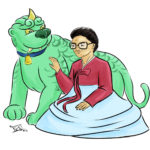Lee Tai-Young (1914-1988)
Art by Cathy S. (deviantart)
In 1952, 38 year old Tai-Young qualified as the first female lawyer in Korea. Her path to to law school had been long and difficult. Although her parents came from locally prominent families, her father died when Tai-Young was only a year old and her mother struggled to keep the family afloat. Despite her economic obstacles, Tai-Young managed to graduate from college and enroll at Ewha Womans University. At the time, the university only offered degrees in liberal arts, music, and home economics. Although she hoped to attend law school, Tai-Young majored in home economics after a professor pointed out that domestic labor kept women from achieving outside the home. Like her professor, Tai-Young hoped that home economics could be used to lighten the workload of women.
After graduation, Tai-Young took a job at Pyongyang Women’s Bible College. She soon married a Western educated Korean man and the couple eventually had four children. During World War II, Tai-Young’s husband was accused of spying for the US and imprisoned by the colonial Japanese government. Finding herself the sole supporter of her family, Tai-Young sold handmade quilts to augment her teaching salary.
After the war, Tai-Young’s husband took on a prominent role in the new government. Knowing how hard she worked to feed their family during the war, Tai-Young’s husband encouraged her to fulfill her dream of law school while he supported the family financially.
In 1946, Seoul University opened its doors to female students and Tai-Young passed the law school’s entrance exam. She was the only female applicant and her home economics degree made the admissions committee pause, but Tai-Young was allowed to enroll as a law student. Most Korean law students devoted their entire lives to their studies, but Tai-Young’s attentions were divided. She gave birth to her fourth and final child during her studies and although her mother-in-law took over many of the domestic responsibilities, Tai-Young could not disappear into a monastery as many of her male classmates did. Despite these challenges, she passed the National Judicial Exam six years later.
In 1957, Tai-Young opened her own practice providing services to poor women. The firm was eventually renamed the Korea Legal Aid Center for Family Relations and sees more than 10,000 clients a year. At the same time, Tai-Young worked with other activists to protect women’s legal rights and helped to established the first family court in Korea.
Conflict with Korean President Park Chung-Hee lead to Tai-Young’s arrest in 1977. She was given a suspended sentence of three years and lost her law license for 10 years. Although this shortened Tai-Young’s career, it did not undo all that she had accomplished. Tai-Young died in 1998.

Just another WordPress site
